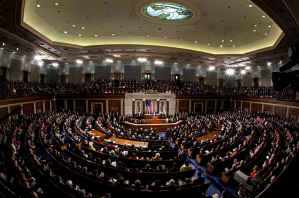
The reactions varied to President Barack Obama's annual State of the Union address. This was bound to happen, given that the president addressed a Congress where the Republican majority controlled both the House and Senate.
Although economic themes played a huge role in the president's speech, Obama reinforced the notion that "we are a people who value the dignity and worth of every citizen." According to Ben Johnson of Life Site News, he urged Republicans to embrace his controversial health care proposals.
"We still may not agree on a woman's right to choose, but surely we can agree it's a good thing that teen pregnancies and abortions are nearing all-time lows, and that every woman should have access to the health care she needs," Obama said.
Johnson noted that Family Research Council President Tony Perkins was riled by the abortion references made by the president.
"While pointing to a decline in the number of abortions, he failed to mention that the taxpayer funding of abortion within ObamaCare, which violates the conscience of millions of Americans, threatens to reverse this decline," Perkins said.
Perkins argued that "the state of our union is only as strong as the state of our family," adding that Obama failed "to recognize this truth."
"His policies continue to penalize marriage and families, which are vital to economic fairness and success," Perkins said. "It is unfair to penalize marriage in the tax code, and it doesn't make economic sense."
According to Dan Balz of the Washington Post, the speech was the expression of a politician who was willing to take on the GOP during his final two years in office and who wanted to set the terms of 2016. It also came on the heels of the 2014 election results, where Democrats lost seats in both houses of Congress by large numbers.
"For most of the 2014 campaign, Obama was forced to the sidelines, spurned by members of his own party who ran away from him as best they could," Balz wrote. "As they went down to defeat, he chafed from afar, his voice muffled. In the aftermath, he said neither he nor the Democrats had made an effective argument on their own behalf."
Balz added that the president "runs most confidently when he runs alone."
"However much his party may have suffered, however significant the gains by the opposition party, he was there to remind Republicans that, if they have won a pair of midterm elections, he has twice won the White House," Balz wrote. "He even poked them with an ad-libbed line that said exactly that when they applauded the fact that he has no more campaigns to run."
Balz noted that the speech largely focused on the theme of middle-class economics. Despite raising them, Obama's proposals are most likely to face stiff opposition from the Republicans.
"Unlike many past State of the Union speeches, Obama did not offer a laundry list of initiatives," Balz wrote. "This was not a speech filled with paragraphs that resulted from agency-by-agency bidding for a sliver of recognition as if part of the annual budgetary review. It was an expression of values - Obama's Democratic values."
The president tried to prove that the economic improvements seen across the United States were a "vindication of his policies."
"It has been, and still is, a hard time for many," Obama said. "But tonight we turn the page."
According to Balz, Obama threatened to use his veto power against the Republicans, calling them out for opposing a higher minimum wage.
"If you truly believe you could work full-time and support a family on less than $15,000 a year, go try it," Obama contended. "If not, vote to give millions of the hardest-working people in America a raise."
Balz thought that the president's speech was made mostly to help Democrats set their 2016 agenda, given that the chances of Republicans working with Obama were "minimal."
"Having twice won election victories, Obama is confident that the agenda he outlined - again - is one that can put the Democrats in a stronger position entering the 2016 campaign, even if there is minimal progress between now and then," Balz wrote. "If his presidential legacy rests in part on the Democrats' ability to retain the White House in 2016, Tuesday's speech was the opening argument."







